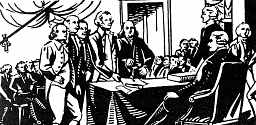 After the Revolution, as we mentioned, Franklin went to France as the American ambassador. While in Paris, he became extremely interested in Montgolfier's balloon experiments; and, 160 years ago, he wrote this, "Five thousand balloons could not cost more than five large ships and where is the Ruler who can afford to cover his country with troops for its defense so that ten thousand men descending from the clouds could not do an infinite amount of harm?" |








